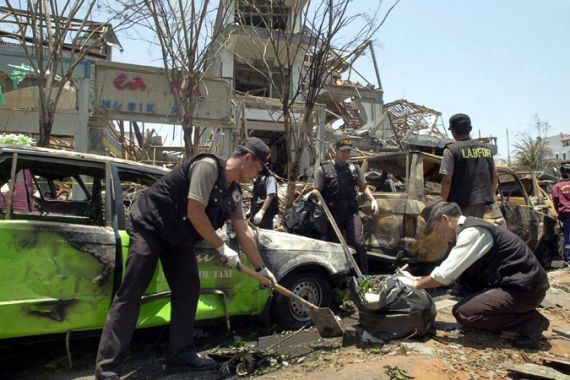Verdict due in Bali bombing case
Indonesian court will decide fate of Umar Patek, accused of assembling explosives for 2002 attacks which killed scores.

An Indonesia court is due to hand down its verdict against Umar Patek, dubbed “Demolition Man”, for his role in the 2002 Bali bombings, bringing a 10-year probe into the nation’s deadliest attack to a close.
Patek, 45, is accused of assembling explosives for twin suicide bombings on a bar and a nightclub in Bali that killed 202 people, including 88 Australians, and church attacks in Jakarta on Christmas Eve in 2000 that killed 19.
The West Jakarta district court opened the session at around 9:20am on Thursday (0220GMT) with about 100 journalists, many Australian, crammed into a small 12-seater section to hear Patek’s fate four months after the trial began.
Around 300 police were guarding the courtroom and four snipers stood atop neighbouring buildings, West Jakarta police chief Widodo told the AFP news agency.
State prosecutors have sought a life sentence for Patek, dubbed “Demolition Man” by local media.
He is accused of illegal weapons possession, concealing terrorist acts, immigration violations and premeditated murder.
But the court was told that his role was comparatively minor. Patek says he never agreed with the bomb attack and has apologised for the first time to the victims and their families.
“I feel sorry for the mistakes I’ve made. Actually, I never agreed with that action [bombing in Bali]. I accept on the basis of Islamic law that the action I took in the bombing was wrong,” he said in May.
Before his arrest, Patek was the most-wanted terror suspect in Indonesia and the United States had a $1m bounty on his head.
After more than eight years on the run, he was arrested in the Pakistani town of Abbottabad in January 2011, where US commandos killed al-Qaeda leader Osama bin Laden four months later. He was extradited to Indonesia in August.
‘Expert’ bombmaker
Patek has testified that he played a minor role in assembling the explosives, saying he mixed only 50kg of chemicals out of a tonne, and denied having any bombmaking expertise.
But US FBI special agent Frank Pellegrino testified in April that Patek was well known as an expert bombmaker among fighters in the region.
Pellegrino said the FBI had collected evidence that Patek planned to kill US troops and suggested he went to Abbottabad to meet bin Laden before his arrest, a claim Patek has repeatedly denied.
Patek is the last suspect detained in Indonesia to be tried for the attacks.
“Indonesians and the international community have long waited for this case to be over,” prosecutor Bambang Suharyadi said last month.
The 2002 Bali bombings triggered a long crackdown in Indonesia, focused on weakening the al-Qaeda-linked Jemaah Islamiyah (JI) network blamed for the bombings.
Anti-terror squads trained by Australian and US police have conducted bloody raids, killing Dulmatin and Noordin Mohammed Top, suspected of helping orchestrate the attacks, and Malaysian Azahari Husin, an alleged bombmaker.
Indonesia also executed three men in 2008 – Imam Samudra, and brothers Amrozi bin Nurhasyim and Ali Ghufron, known as Mukhlas – for playing major roles on the ground in the operation.
Several others have been jailed, including bombmaker Ali Imron, who was given a life sentence for helping build and deliver bombs.
The only suspect yet to be tried is Riduan Isamuddin, known as Hambali, who allegedly helped orchestrate the attacks and has been detained at the US naval base at Guantanamo Bay since 2006, accused of having financial links to al-Qaeda.